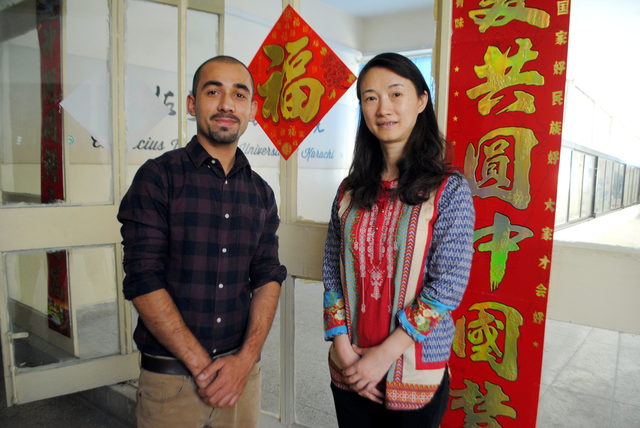Just as you enter Iqbal Karim’s room, one gets overwhelmed instantly. It’s not because how unorganized his study table looks or how the almost-vintage metal cupboard representing a bygone era adorns this 25-year old’s room. Instead, it’s the neon colored vertical stripes hanging on the wall that grab the entrants’ attention; even more so these stripes contain a language understood by a handful of people in Pakistan. Karim, however, is quite familiar with the Chinese language.

Hailing from the picturesque Hunza Valley, Karim started learning the Chinese language some two years ago and now teaches the language to about 700 students; 600 at Beaconhouse School System and 40 at another institute, in addition to giving private group tuitions in Karachi.
It is said that the Chinese language is becoming the next business language of the world; at least it appears to be so in Pakistan. Confucius Institute at University of Karachi (CI UoK) was established in January 2012. By December 2012, there were only 74 students in two classes conducted by four teachers; currently there are 950 students learning the language. Karachi University has approved and now offers Chinese language as a minor subject in the social sciences.
In the early 90s, when China had completed its development at home, it started focusing beyond its geographical borders and commenced work on its ‘worldview’, opening 500 institutions in a bid to attract foreigners and tourists to the country.
“Learning Chinese is like playing your favorite game, one that doesn’t bore you no matter how much you play it,” says Karim, who started learning Chinese when he was earning a meagre Rs17,000 as an accountant. His income since then has quadrupled.
Karim’s boss was not willing to support his subordinate’s resolve to learn a new language, and initially refused to grant him permission for attending the language course. It was not until Karim threatened to resign that the manager finally allowed him to go for it. Though, he made sure Karim had to pay a price of Rs 3,000 as a deduction from his salary (Rs 20,000), a condition imposed by his boss for letting him attend the language course.
As the number of students enrolling for the course continues to rise, Confucius Institute has divided students into 40 batches dealt by 15 teachers; with each teacher responsible for teaching 20 students per week. The institute offers Level 1 – Level 5 of Chinese language courses, with classes being held in the morning, afternoon, evening, including the weekends.
“Confucius Institute UoK has designed the language course keeping in mind that almost all of students are either taking the course as an addition to their primary studies, or are currently working,” says Siddiqui, while explaining that the course workload is designed to suit people with busy work or study routines.
The institute has also introduced two spoken Chinese language classes for people who want to practice Chinese language and Chinese calligraphy classes. It has introduced Youth Chinese Test Program aimed at Pakistan’s youth.


Like IELTS and TOEFL, China has introduced Hanyu Shuiping Kaoshi (HSK) which has six levels to test proficiency in Chinese language. To make it more simple and comprehensive, they have not only divided the language in levels but have also introduced modules, courses and syllabi, says Moin Uddin Siddiqui, Director Confucius Institute at UoK.
A student can pass 3 levels of HSK after one year’s intensive study — each course is completed in about 3.5 to 4 months. Only ten students are enrolled at the institute for HSK Level V. Majority of the students study only up to Level IV – the level where they attain the proficiency to read, write, listen to and speak Chinese language.

Karim has been learning Chinese language characters by creating stories on his own since unlike English or Urdu, Chinese language has no alphabets.Rather, it has different characters which represent a particular thing or situation.
Chinese linguistics have simplified the language for foreign students by introducing the Pinyin system, which is Romanization of Chinese language characters based on their pronunciation.
“Classical characters are much more difficult to learn,” admits Karim, even though he himself has learned 1,200 characters and aspires to learn up to 5,000. For this reason, he is looking for a Chinese Language Scholarship in China
A student, after learning the language over a two-year period can earn at least Rs 50,000 to Rs 60,000. A student of the Confucius Institute landed a lucrative job offer of Rs 150,000 in Islamabad, while another graduate of the language course secured a job offer paying Rs120,000.
In addition, the Chinese Consulate in Karachi has hired a female student. “These are our students, and they got a job solely based on the proficiency and command they have over the language,” says the director.
According to Pakistan Bureau of Statistics (PBS) the country has an unemployment rate of approximately 8.5 pc, which means about 700,000 people are unemployed. Chinese language courses are expected to help create employment since there is a large presence of Chinese companies in Pakistan, particularly because companies are showing great interest in investing in the country in various projects under CPEC.
However, the biggest upside to learning the language is the option to secure higher education scholarships being offered in China. There are thousands of colleges and universities in China which offer scholarships and the medium of instruction is Chinese. “Students with proficiency in Chinese language are very likely to secure these scholarships,” says Moin Uddin Siddiqui, adding that the opportunities are endless.
Pakistani students studying in China benefit from their place of learning in many ways. The Chinese believe in a holistic lifestyle, and their teaching methodology includes music, martial arts (Tai Chi), exercise, art and meditation, among countless others. Many of these are sometimes unheard of, as is the case with ‘Lajin’ (literally means stretching of the tendons and ligaments), a sub-branch of Qi Qong, which is popular in the west. Cross-cultural exchanges between any two countries usually result in increased understanding between the people of those countries, and thus promotes the transfer of knowledge and beliefs from one location to another.
Karim has not only gained proficiency in the lingo of this phenomenal nation but has also learned a lot about their culture and lifestyle. He can sing, dance, and even cook like the Chinese. Karim encourages his students to indulge in such co curricular activities, the likes of making a Chinese wall and cooking the local delicacies.
“They (Chinese) ask two questions routinely when they meet someone: what’s your age, and what are your hobbies,” says Karim, and goes on to explain that a person’s age indicates the tentative amount of time he is left with in life to achieve his goals, and the hobbies of a person reveal the nature of his personality etc.


Confucius’ philosophy and teachings are revered by the Chinese. Karim is very much inspired by the morals of the Chinese community, with the people’s focus on giving importance to the family and considering it as one unit.
“Whatever these people do, they do it for their fellow countrymen and culture. Not a penny is spent without analyzing its impact on the country as whole,” reveals Karim, while talking about the heightened sense of responsibility he observed in the locals during his stay in China. “I simply love their moral values.”
Chinese teachers have been another source of inspiration and encouragement for Karim.
“In 14 years of my educational life I spent in Pakistan, not a single teacher managed to leave a lasting impression on me. A Chinese teacher will put you back on track in just a fortnight,” claims Karim.
There are five centers of Confucius Institutions in Pakistan: 1, NUML University, Islamabad; 2, University of Karachi; 3, Agricultural University, Faisalabad; 4, Punjab University, Lahore and 5th Baluchistan University, Quetta. It has launched more than 500 institutes in 140 countries around the world.
Karim’s obsession with the Chinese language, and his desire to master it is so overwhelming that he has scribbled Chinese language characters everywhere: his bathroom, his bedroom and even the office kitchen has not been spared from Karim’s incessant endeavors to learn the language.

Many a times, Karim’s colleagues have complained about his character-scribbling habit, and was once compelled to find a new room for himself when his roommates found his habit unacceptable.
“I sometimes used to scribble the characters on a colleague’s desks or a roommate’s wall so that I could see it in front of my eyes and then memorize it,” says Karim.
























